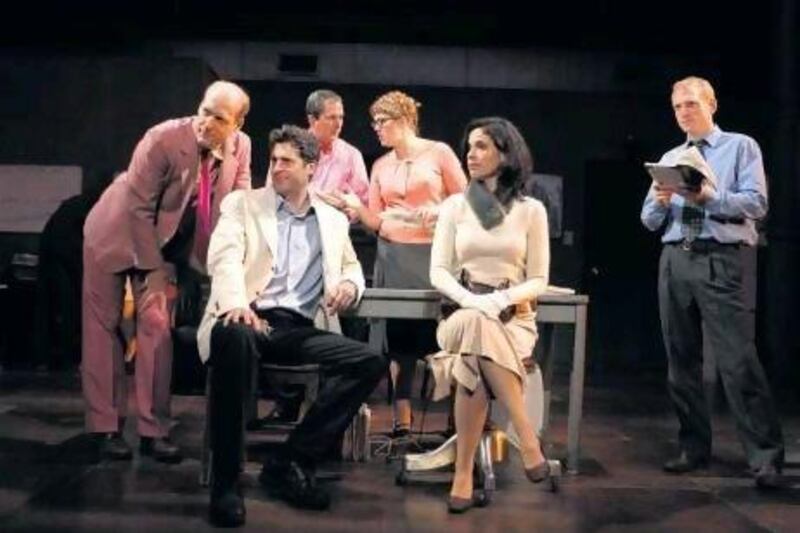It's certainly shaping up to be the year of The Great Gatsby. F Scott Fitzgerald's most popular novel by some distance will be performed as an opera in San Francisco and as both a high-profile musical and an intriguing site-specific "immersive" show (with an invitation to come dressed in 1920s costume) in London. Most notably, there's the forthcoming Baz Luhrmann film version of Fitzgerald's tale of class and money in booming America, starring Leonardo DiCaprio and Carey Mulligan.
All of these will, no doubt, offend fans of the book in some way - when Luhrmann announced last year that the movie would be in 3D, there was widespread derision. And all this was after countless articles had declared The Great Gatsby unfilmable, too.
But even the purists will be able to embrace a Gatsby in 2012, for one company will be bringing the entire book to the stage - in a bottom-numbing eight-hour marathon.
Gatz, as the New York theatre company Elevator Repair Service (ERS) calls its faithful take on the classic novel, is not a new production. It actually began life in 2005 as a theatre workshop and garnered such high praise - in 2010 The New York Times called it "the most remarkable achievement in theatre, not only of this year but also of this decade" - that ERS has taken the show around the world. And yes, it does include every word of the book - Scott Shepherd, who plays Nick, the narrator in the novel, could genuinely recite the whole novel off by heart, if asked.
But the London run, announced last week, is special - not least because initially the Fitzgerald estate blocked its performance in London and New York. With the licensing difficulties finally ironed out, ERS is now free to promote what will surely be one of the most talked-about shows of the year.
On its website, the producers insist that even though the actors are in contemporary dress in a drab office building, this is not an adaptation of the Gatsby story but an enactment of the novel itself. A subtle but interesting difference - most reviewers have noted that Gatz is like a more intense version of reading the book, but in one sitting, without any of the distractions of modern life.
Of course, lengthy theatrical productions are nothing new. Tim Supple's multilingual One Thousand and One Nights stage adaptation, which made a brief visit to Abu Dhabi in 2010 when the production was in its final planning stages, was, in the end, a six-hour spectacular despite the fact that the Lebanese author Hanan Al Shaykh translated just 19 of the famous stories of Arabian life also known as Alf Layla wa-Layla. Although premiered in two more manageable halves of three hours, it was still a major undertaking for both the audience and the actors. But Supple and Al Shaykh felt the length was necessary to maintain the idea of multilayered stories with deep emotional truths about power, fate, property and money. Like Gatz, in a sense, fidelity to the original aims of the writers was more important than whether it could be cut down into bite-size chunks, wrapped up in less than two hours.
And there is something genuinely exciting about lengthy plays. It's often said we don't have the time these days for such endeavours - but how often are we actually given the opportunity to try to immerse ourselves in another world for an extended period of time? Naturally, it helps if the staging is good. It would have been slightly unfortunate to acquire one of the hot tickets of the 2010 New York theatre season - a 12-hour production of Dostoevsky's The Demons, which was only reachable via a 9.45am ferry to a deserted military base - only to agree with The New York Times that it was a "long, slow fizzle".
But Peter Brook's nine-hour version of the Indian epic poem The Mahabarata, staged for the first time in 1985, was important not only because it was well directed, but because it introduced western audiences to an Indian classic for the first time. The Canadian playwright and director Robert Lepage has made something of a name for himself with his protracted plays - the nine-hour Lipsynch was inspired by an extended exploration of the human voice, for example - which always have moments of sheer beauty that are worth the wait.
If done well, then, the lengthy play can be a magical, communal, almost transcendental experience. For that reason alone, it would be fascinating to see, say, Vikram Seth's epic 1,349-page novel set in post-partition India, A Suitable Boy, given the Gatz treatment. Although it would be a frankly impossible undertaking: if Gatz takes eight hours, then A Suitable Boy would take more than two full days.
As for Gatz, apparently it comes with a very civilised "one and a half-hour supper break". Which, to be honest, sounds just as appealing as the play.
• For more information, visit www.gatzlondon.com
Follow
Arts & Life on Twitter
to keep up with all the latest news and events
[ @LifeNationalUAE ]





